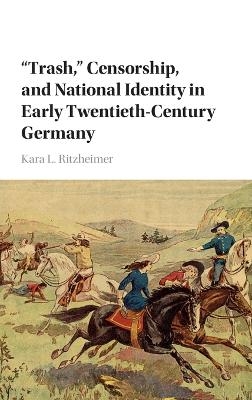
'Trash,' Censorship, and National Identity in Early Twentieth-Century Germany
Cambridge University Press (Verlag)
978-1-107-13204-7 (ISBN)
Convinced that sexual immorality and unstable gender norms were endangering national recovery after World War One, German lawmakers drafted a constitution in 1919 legalizing the censorship of movies and pulp fiction, and prioritizing social rights over individual rights. These provisions enabled legislations to adopt two national censorship laws intended to regulate the movie industry and retail trade in pulp fiction. Both laws had their ideological origins in grass-roots anti-'trash' campaigns inspired by early encounters with commercial mass culture and Germany's federalist structure. Before the war, activists characterized censorship as a form of youth protection. Afterwards, they described it as a form of social welfare. Local activists and authorities enforcing the decisions of federal censors made censorship familiar and respectable even as these laws became a lightning rod for criticism of the young republic. Nazi leaders subsequently refashioned anti-'trash' rhetoric to justify the stringent censorship regime they imposed on Germany.
Kara L. Ritzheimer is an assistant professor of history at Oregon State University (OSU). She received her Ph.D. from State University of New York, Binghamton and is the recipient of a Fulbright Fellowship, a Center for the Humanities Fellowship at OSU, and a Faculty Research Grant from OSU. She has published previously on the topics of censorship and gender in Weimar Germany and has participated in summer seminars hosted by the German History Institute, the United States Holocaust Memorial Museum, and the Fulbright Commission in Germany. She is a member of the German Studies Association and the Society for the History of Childhood and Youth.
Introduction: censorship in the Rechtsstaat, censorship in the Sozialstaat; 1. Buffalo Bill in Germany: regional encounters with commercial culture before WWI; 2. Federalism and censorship: regulating commercial fiction and movies in Imperial Germany; 3. Censorship in the Rechtsstaat: anti-'trash' rhetoric and national identity in Imperial Germany; 4. Censorship and 'trash' in wartime Germany; 5. Censorship in the Sozialstaat: Weimar's film and publications laws; 6. Censorship, morality, and national identity in Weimar Germany; Epilogue; Bibliography; Index.
| Erscheinungsdatum | 02.07.2016 |
|---|---|
| Verlagsort | Cambridge |
| Sprache | englisch |
| Maße | 160 x 236 mm |
| Gewicht | 620 g |
| Themenwelt | Geisteswissenschaften ► Geschichte ► Regional- / Ländergeschichte |
| Geschichte ► Teilgebiete der Geschichte ► Militärgeschichte | |
| Recht / Steuern ► EU / Internationales Recht | |
| Recht / Steuern ► Rechtsgeschichte | |
| Sozialwissenschaften ► Kommunikation / Medien ► Journalistik | |
| Sozialwissenschaften ► Politik / Verwaltung | |
| Wirtschaft | |
| ISBN-10 | 1-107-13204-5 / 1107132045 |
| ISBN-13 | 978-1-107-13204-7 / 9781107132047 |
| Zustand | Neuware |
| Haben Sie eine Frage zum Produkt? |
aus dem Bereich


